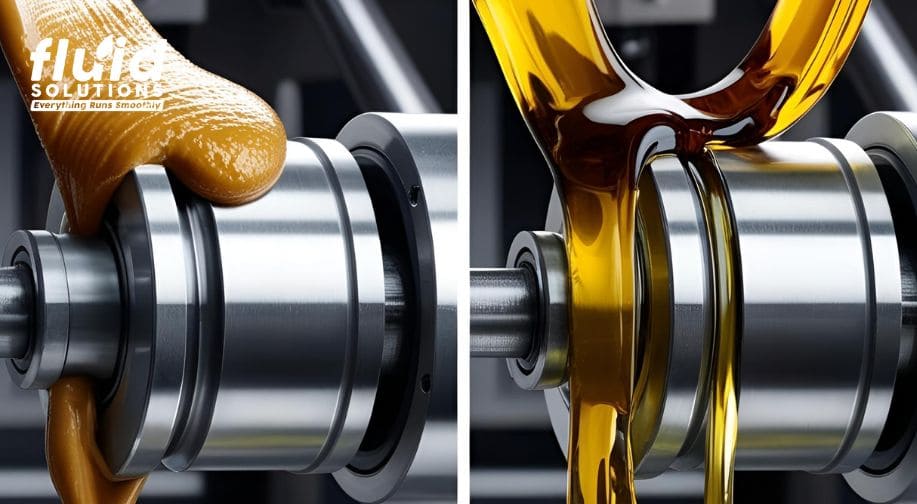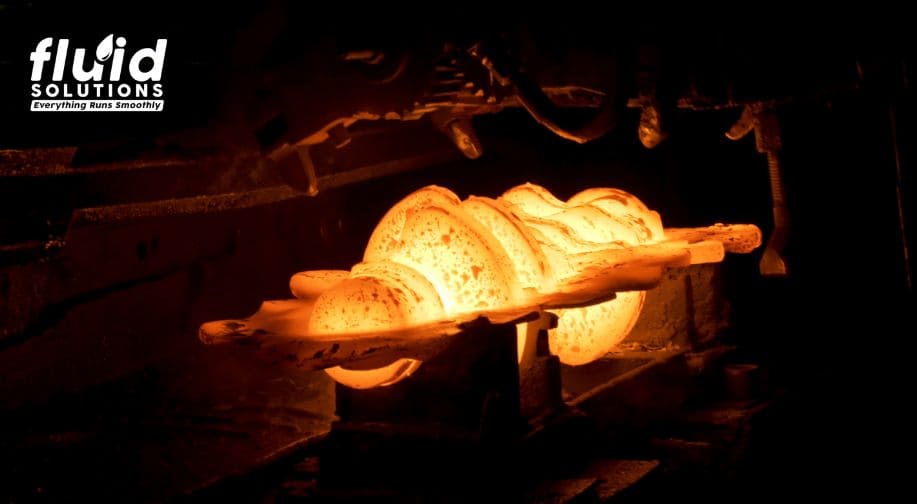
Lubrication plays a critical role in the efficiency, performance, and longevity of industrial machinery. Proper lubrication minimizes friction, reduces wear and tear, and prevents costly breakdowns. Choosing the right lubricants, whether greases or oils, is important for ensuring smooth operations across various industries, including manufacturing, agriculture, food and beverage, and power generation.
Both greases and oils serve as essential lubricants, but they have distinct properties and applications. Understanding their differences helps industries and machine operators make informed decisions regarding maintenance and operational efficiency. This article compares greases and oil lubricants, outlining their key differences, advantages, and the best applications for each.
Key Takeaways:
- Greases stay in place, seal well, and suit heavy-duty, low-maintenance machinery.
- Oils flow, cool better, and fit high-speed, high-temp systems.
- Greases need less frequent reapplication; while oils need regular top-ups.
- Choose based on speed, temperature, load, and environment.
Greases vs. Oil Lubricants
Greases and oil lubricants serve different purposes in industrial and automotive applications. Greases are semi-solid lubricants made from oils and thickening agents, allowing them to stay in place and protect components in harsh or hard-to-reach areas. Oils, on the other hand, are free-flowing fluids that offer superior heat dissipation and are ideal for high-speed or high-temperature operations. We’ve explored both lubrication types in previous blogs, highlighting how each suits specific machinery and operating conditions.
Both lubricants serve specific functions, and choosing between them depends on operational requirements, environmental conditions, and machinery specifications.
Greases and Oils Differences
1. Consistency & Application
Greases are thicker and adhere well to surfaces, making them ideal for applications where lubrication must stay in place for extended periods. Heavy equipment greases are commonly used for bearings and greases that operate under high loads and intermittent motions.
Oils, being fluids, are best suited for systems requiring continuous lubrication. They flow freely, reducing friction in high-speed components, such as engines, turbines, and hydraulic systems. However, they require well-designed circulation systems to ensure proper distribution.
2. Performance Under Temperature

Greases offer better stabilities in extreme temperature conditions. Specialized high-temperature grease formulations remain effective even in environments with fluctuating temperatures, ensuring consistent lubrication without degradations.
Oils provide superior heat dissipation, making them excellent choices for high-temperature applications. Because they circulate through systems, they effectively transfer heat away from moving parts, preventing overheating.
3. Re-lubrication Frequency
One advantage of greases is their longevity. They remain in place for extended periods and require less frequent reapplications. However, over time, greases may harden or become contaminated, requiring periodic replacements.
Oils require more frequent top-ups as they can degrade because of oxidation and contamination. Replacement duration is typically shorter for oils.
4. Protection & Sealing
Greases provide additional sealing effects, helping to protect machinery components from contaminants such as dust, dirt, and moisture. This makes them excellent choices for outdoor and heavy-duty equipment exposed to harsh environments.
Oils, while providing excellent lubrication, require additional sealing mechanisms to prevent leaks and contamination. Proper filtration and sealing systems are essential for maintaining oil quality and ensuring effective lubrication.
When to Use Greases Vs. Oils
The selection between greases and oils depends on several key factors, including operational conditions, environmental exposures, and equipment types. Here are lubrication guides to help determine when to use greases vs. oils in industrial applications:
When to Use Grease:
- For machinery with infrequent maintenance access (e.g., bearings, gears, and joints)
- When additional sealing protection against contaminants is needed,
- In applications requiring high-load capacity and long-lasting lubrication
- For heavy equipment operating in harsh environments (e.g., mining, agriculture, and construction)
When to Use Oils:
- For high-speed machinery such as engines, turbines, and hydraulic systems
- In applications requiring efficient heat dissipation and continuous lubrication
- Where automated or circulating lubrication systems are in place
By carefully evaluating the requirements of your machinery, you can optimize performance and extend the equipment’s lifespan through the right lubrication choice.
Find the Best Lubrication Solution with Fluid Solutions
As a trusted oil and grease supplier in the Philippines, Fluid Solutions Inc. provides a wide range of high-quality oil and grease lubricants tailored for various industries. With over 16 years of expertise in lubrication solutions, we ensure businesses get the most effective products for their specific needs.
Our Offerings Include:
- General Lubrication Products – A comprehensive selection of industrial oils and greases for various applications.
- Industry-Specific Lubrication Solutions – Tailored lubrication products designed for sectors like manufacturing, food processing, and power generation.
- Expert Consultation Services – Our specialists provide guidance on selecting the right lubrication strategies for optimal machinery performance.
Ensure your machinery operates at peak efficiency with the right lubrication solutions. Contact Fluid Solutions Inc. today for expert recommendations and premium grease and oil products.
Call (02) 8370 5928 / (0917) 894 9156 or email via inquiry@fluidsolutions.com.ph to learn more about our comprehensive products and services.
By choosing the right lubricant and a reliable oil and grease supplier in the Philippines, you can enhance productivity, reduce maintenance costs, and extend the life of your machinery.
Social Media Links:
Facebook: https://www.facebook.com/fluidsolutionsinc
LinkedIn: https://www.linkedin.com/company/fluid-solutions-inc


